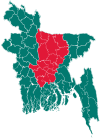Keraniganj Upazila
| Keraniganj কেরানীগঞ্জ | |
|---|---|
| Upazila | |
 Keraniganj Location in Bangladesh | |
| Coordinates: 23°41′N 90°20′E / 23.683°N 90.333°ECoordinates: 23°41′N 90°20′E / 23.683°N 90.333°E | |
| Country |
|
| Division | Dhaka Division |
| District | Dhaka District |
| Area | |
| • Total | 150 km2 (60 sq mi) |
| Population (2015) | |
| • Total | 830,174 |
| • Density | 5,000/km2 (10,000/sq mi) |
| Time zone | BST (UTC+6) |
| Website | Official Map of Keraniganj |
Keraniganj (Bengali: কেরানীগঞ্জ) is an upazila of Dhaka District in the division of Dhaka, Bangladesh.[1]
History
It is believed that during the reign of Nawab Sayesta Khan the paik-peyada and clerical staff (kerani) of the Nawab used to live on the other side of the river Buriganga. Keraniganj is named after this. Historically, it is believed that, after the regime change in 1757, Nawab Siraj ud-Daulah's wife and one of his aunts were in prison at Jinjira in Keraniganj. Strategically, Keraniganj played a vital role during the liberation war of Bangladesh (1971), specially in the guerilla warfare. Many of the guerilla operations in Dhaka city were planned and conducted from Keraniganj and, for this reason, it had to pay for this. The Pakistani army set fire to many houses in Konakhola, Basta, Brahmankirtha, Ghatarchar, Monohorea, Jaynagar, Goalkhali and Khagail Kholamora villages. The freedom Fighters later conducted extensive guerilla attack on the Pakistani army.
Geography
The town of Keraniganj stands on the southwest side of Dhaka City on the bank of the Buriganga river. Keraniganj Upazila with an area of 166.87 km2, is bounded by Savar Upazila and Mohammadpur, Hazaribagh, Kamrangir Char, Lalbagh, Kotwali and Sutrapur Thanas to the northeast, Shyampur Thana and Narayanganj and Sadar Upazilas to the east, Serajdikhan Upazila to the south, and by Nawabganj and Singair Upazilas to the west. The main rivers are the Buriganga and Dhaleshwari. Keraniganj is connected to Dhaka Metropolitan through two modern bridge (Buriganga Bridge-2 and Bangladesh China friendship bridge which is also known as Burignaga Bridge-1) over Buriganga river. According to police administration, Keranigong is now divided into two thanas which are South Keraniganj and Keraniganj Model Thana, respectively. The Bangladesh government has a plan to integrate Keraniganj Upazila into Dhaka municipality in the near future, to accommodate the expansion of the capital.
Demographics
As of the 1991 Bangladesh census, Keraniganj had a population of 530,174. Males constitute were 54.6% of the population, and females 45.4%. This Upazila's eighteen up population was 283,997. Keraniganj had an average literacy rate of 37.7% (7+ years), and the national average of 32.4% literate.[2]
Administration
Keraniganj has 11 Unions/Wards, 123 Mauzas/Mahallas, and 399 villages.
Education
Educational Institutions: Educational and Religious institutions: Kenanigonj Upazila has 8 colleges, 18 high school, 2 junior high school, 11 Madrasa, 102 government primary school and 10 non-government primary school. Religious: There are 473 mosque, 151 temple, 1 tomb and 60 eidgah, most noted of which is the tomb of Adu Pagla.
Notable residents
- Mohammad Rafique, Left Arm Spinner for Bangladesh National Cricket Team
See also
References
- ↑ Farooque, Md Abu Hasan (2012). "Keraniganj Upazila". In Islam, Sirajul; Jamal, Ahmed A. Banglapedia: National Encyclopedia of Bangladesh (Second ed.). Asiatic Society of Bangladesh.
- ↑ "Population Census Wing, BBS.". Archived from the original on 2005-03-27. Retrieved November 10, 2006.
